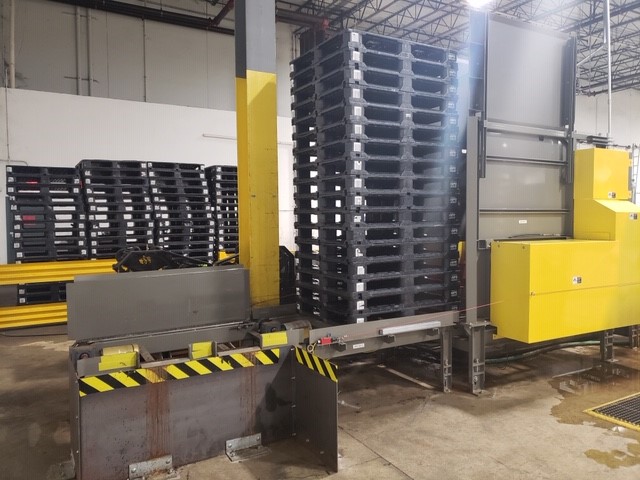The latest pharma supply chain trends center on the relatively new ability to track pharmaceuticals through every step of the supply chain–from manufacturing to the pharmacy–and to use the data collected via tracking to improve processes. Methods like just-in-time (JIT) manufacturing are made possible through tracking and data collection technology and allow manufacturers to scale supply and avoid overproduction. Blockchain technology makes it possible to track products effectively without the risk of security breaches. Even old trends like lean supply chain management become new again with access to real-time data.
Of course, supply chain managers will need to consider ways to effectively collect the data they need. The most cost-effective options are built around load unit level tracking of pallets. And as supply chain managers become increasingly dependent on their platforms to supply information, they will want to consider upgrading to strong plastic pallets with built-in radio-frequency identification (RFID) and barcode tracking. Plastic pallets make it possible for your supply chain to take advantage of a new era in pharmaceutical supply chain management.
Three Industry-Changing Pharma Supply Chain Trends
 Many of the most important pharma supply chain trends today aren’t exactly new. It’s just the first time they’ve been introduced into the pharmaceutical industry. What is driving these technologies is greater access to data which, when properly leveraged, provides insight that can improve all aspects of the pharmaceutical supply chain. Here are just a few examples:
Many of the most important pharma supply chain trends today aren’t exactly new. It’s just the first time they’ve been introduced into the pharmaceutical industry. What is driving these technologies is greater access to data which, when properly leveraged, provides insight that can improve all aspects of the pharmaceutical supply chain. Here are just a few examples:
- Just-in-time (JIT) manufacturing: JIT, in which companies allow consumer demand to drive production, could be a useful way to minimize issues with returned pills for manufacturers. While returned pills only account for two to three percent of annual sales, this still puts actual losses from overproduction by U.S. pharmaceutical companies in the billions. As today’s manufacturers have more opportunities to track real-time data based on demand, they can scale manufacturing and reduce waste due to overproduction.
- Lean methodology: Lean programs have impacted many aspects of manufacturing over the past few decades, but they’ve been slow to take off in the pharmaceutical industry. Lack of access to information is a likely culprit for this. However, today’s technology allows for better monitoring of the supply chain, including cold chain practices, meaning that it’s much easier to make the continual small improvements that are crucial to lean implementation.
- Blockchain: Blockchain is a type of distributed ledger technology that helps supply managers track shipments through a decentralized application. This application makes data visible and transparent through a peer-to-peer network while limiting the ability to change recorded data. This makes it ideal for tracking items through the many stages of the supply chain while preventing issues with counterfeit drugs and falsified records.
Pallet-level RFID tags and barcodes will become crucial components of the supply chain.
Of course, data is only as good as the methods used to collect it. Pallet-level RFID tags and barcodes will become crucial components of the supply chain as they allow manufacturers to track the movement of pallets of products in real-time. However, commonly-used wood pallets make it more difficult to accomplish this task.
Preparing for the Future of Pharma with Plastic Pallets
 Reliable tracking methods are crucial to support many of the biggest pharma supply chain trends today. However, many companies are still dependent on wood pallets, which don’t work effectively with tracking methods such as RFID tags.
Reliable tracking methods are crucial to support many of the biggest pharma supply chain trends today. However, many companies are still dependent on wood pallets, which don’t work effectively with tracking methods such as RFID tags.
RFID tags aren’t ideal for use with wood pallets since they will eventually be lost when a portion of the pallet breaks off and is left behind, or when the board to which the tag is attached is replaced during a repair. Durable plastic pallets, on the other hand, can be embedded with an RFID tag, which can be easily tracked and scanned without any danger of the tag detaching. Pallet-level RFID tracking supports the latest trends in supply chain management by providing a unique identifier for evaluating JIT manufacturing standards, implementing lean protocols, and monitoring blockchain data ledgers.
Shipping platforms must be able to support the tracking devices needed to collect data.
Like many other trends in business, pharma supply chain trends are based on data. They depend on greater access to information regarding supply, consumer demand, travel routes, and more. Shipping platforms must be able to support the tracking devices needed to collect this data, and they must also provide sanitary transport for pharmaceuticals like pills and biologics. High-quality tracking-enabled, sanitizable plastic pallets meet both these requirements, providing a hygienic environment for medication while enabling the data collection required to fine-tune your pharmaceutical supply chain.
iGPS rents durable and sanitizable GMA-spec plastic pallets that support pharma supply chain trends by providing multiple methods for tracking shipments. For more information, contact us at 1-800-884-0225, email a specialist at switch@igps.net, or visit our contact page.



